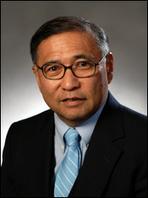Seminar: Learning about a Learning Styles Model - a case driven presentation (based on the Myers-Briggs Type Indicator)
| Event Date: | April 23, 2015 |
|---|---|
| Speaker: | Dr. Charlie Yokomoto |
| Speaker Affiliation: | Professor Emeritus of Electrical and Computer Engineering
IUPUI |
| Time: | 3:30-4:20pm |
| Location: | ARMS B071 |
He will describe how he transitioned from using the learning styles model in the development of teaching modules to coaching individuals in improving learning and test taking. Others have used the model in developing teamwork skills, design skills, and career selection.
You may already have some knowledge of the Myers-Briggs Type Indicator from your educational, conference, and research experiences, from any of the several websites that discuss the instrument, or from reading the related chapter in “Teaching Engineering" by Phil Wankat and Frank Oreovicz.
The presentation will be in workshop/discussion format, focusing on what you can do with the MBTI’s learning styles model and not the model itself, using a presentation method that he developed under a FIPSE grant that he named “Only as Needed.” Using this method, he will introduce cases where students benefitted from his coaching, and then present the particulars of the MBTI model that apply to the specific cases, “only as needed.” By covering a sufficient number of cases, he will be able to present a comprehensive description of the four scales of the learning styles model of the MBTI, the 16 possible types, and how each particular type has its preferred method of learning. Moreover, he will cover some of the intricacies of using a learning styles model that is based on bipolar, forced choice scales, such as the following:
- Is there a difference between a person’s personality type and stereotyping people?
- What do scores on the middle of a bipolar scale mean?
- Can a person of a particular learning style be successful in learning with the style of another?
- Can two people of totally opposite personality types succeed at the same activity, and if so, how does this happen?
- What does the term “individuation” mean when using bipolar scales, and what are its implications?
- What can be said about scores at the extremes of a bipolar scale?
- Can you relate “cognitively crystallized” and “cognitive complex” to the MBTI, and how does this affect learning?
- What does the term “individuation” mean when using bipolar scales, and what are its implications?
- How can you identify signs of cognitive conflict on a person’s MBTI scores
- What is the wisdom of designing instruction to the dominant personality type in a class?
One of the cases he will present describes his own MBTI score, how he learns, how he plans his strategies, what kind of strategies he prefers, and how he executes his strategies. His personality type in the MBTI model is one of the two most likely to drop out of school, including high school. He will use his case to cover many of the above bullet points.
Dr. Yokomoto will entertain questions at any time during the presentation (you will see why he is open to this after he discloses his personality type to you.) If you have questions pertaining to any of the bulleted items, feel free to ask.
Biography
Dr. Yokomoto received all his degrees in Electrical Engineering from Purdue University (BSEE 1964, MSEE 1966, and PhD 1970). He joined the Department of Engineering at IUPUI in 1970 and received tenure in 1974 on the basis of technical research but converted to engineering education in 1980 after attending an Effective Teaching Institute at the Rose-Hulman Institute of Technology, led by Lee Harrisberger. It was at this workshop that he was introduced to the Myers-Briggs Type Indicator and the learning styles theory associated with it. He had been an informal observer of individual differences in how people learned and solved problems in the classroom and in sports. (He played on the Purdue club volleyball team as a graduate student and coached USVBA club volleyball in Indianapolis for several years, and he was a ranked senior tennis player in the six state area that includes Indiana, Ohio, Illinois, Wisconsin, and Michigan while teaching day and night classes (10-12 credits a semester, and doing technical research).
He began collaborating with Dr. Roger Ware of the IUPUI Department of Psychology, who was teaching his department’s course in personality theory. The two began conducting research in the engineering classroom, the psychology classroom, and in the psychology lab. They published papers in psychology journals as well as in proceedings of engineering conference proceedings. With Dr. Ware, he conducted workshops in personality theory, training in middle management, and sports psychology. These activities culminated to his induction as Fellow of ASEE in 2007 in Honolulu, a fitting location since he was born and raised in Hawaii. He retired as full professor of electrical and computer engineering in 2006.
He hopes to live a long life. His mother is 103 and in good health. His mother’s sister will turn 101 soon and is in better health. His dad died at age 91, and his mother said, “Too bad he died so young.”

